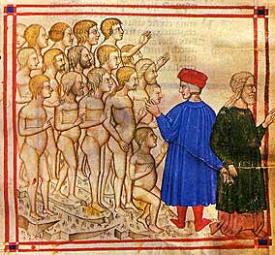
“Virgil in the Middle Ages: Poet, Prophet, and Necromancer”
Justin Haynes PhD, Instructor
In this course, we will examine medieval creativity from many angles by using Virgil, the man and his works, as a guide and unifying theme. Virgil is an ideal focal point for exploring medieval imagination because his oeuvre, as the fundamental school text, shaped every literate mind from Late Antiquity to the Renaissance. In fact, Virgil’s influence is sometimes described as second only to the Bible in shaping medieval literature, yet his poems rely on the full apparatus of pagan mythology. Already in antiquity, readers had reconciled Virgil’s paganism to Christianity by interpreting his works as allegorical prophecies of Christ and Christian morals. Virgil’s characters and stories had such a grip on people’s imagination that poets were often inspired to take the plot of the Aeneid in different directions; such is the case in the Roman d’Enéas—a work which in places resembles modern fan fiction. Even Virgil himself, a mysterious pagan who had knowledge of ancient secrets, inevitably became a character—most famously in Dante’s Inferno and Purgatorio. From the twelfth century onwards, many popular tales cast Virgil as an ambiguous hero who is not afraid to use the black arts. As we explore Virgil’s legacy, we will rely heavily on the late antique commentary tradition which dramatically impacted the way Virgil’s poems were interpreted by their medieval readers. Indeed, we may say with certainty that the Aeneid of Late Antiquity and the Middle Ages was not our Aeneid any more than their Virgil was our Virgil. To help us visualize what Virgil’s ancient and medieval audience imagined, we will make use of the many late antique and medieval illustrations of Virgil’s poems.
Course Schedule:
Week 1
Introduction: “The Classic of All Europe”
Week 2
Virgil: the Man, the Myth, the Legend
A. Donatus, Life of Virgil; Eclogue 4; Scholia on Eclogue 4; Scholia on first line of Aeneid 1; John of Alta Silva, Dolopathos; Brief legends by A. Neckam et al.
Week 3
The Aeneid and Late Antique ‘Christian’ Latin Epic
Juvencus 1; Proba’s Cento; Avitus, De Spiritualis Historiae Gestis 1
Week 4
The Aeneid and Medieval ‘Secular’ Latin Epic
Waltharius; Walter of Châtillon, Alexandreis 1, 10
Week 5
The Vernacular Aeneid: Romance or History?
Roman d’Enéas; Caxton’s Translation of the Aeneid
Week 6
The Aeneid’s Allegorical Commentary Tradition
Selections from Servius on Aeneid 6; Fulgentius on the Aeneid; Bernard Silvestris’ Commentary on the first six books of the Aeneid
Week 7
Dante’s Virgil and Dante’s Aeneid
Inferno; Purgatorio 2, 21; Selections from the Paradiso
Week 8
The Dido Tradition
Ovid, Heroides 7; Servius Commentary on Aeneid 4; Anon. Dido laments; Chaucer, Legend of Dido, House of Fame 1
Week 9
Pastoral in the Fourteenth Century
Dante, Eclogue 1-2; Boccaccio, Eclogue 14; Petrarch, Eclogue 11
Week 10
Conclusion: Virgil in the Renaissance and Beyond
Maffeo Vegio, Book 13 of the Aeneid; Virgil’s Journey to the Magnetic Mountain; Secret
Life of Virgil
Required Texts:
D. Comparetti, Virgil in the Middle Ages, trans. E. Benecke (Princeton, 1997); Servius’s Commentary on Book Four of Virgil’s Aeneid, trans. and ed. C. McDonough, et al. (Wauconda, 2004); J. Ziolkowski and M. Putnam, ed., The Virgilian Tradition: The First Fifteen Hundred Years (New Haven, 2008).
You will also need a translation of the Aeneid and the Eclogues. I suggest you purchase the Loeb edition which additionally contains the Georgics as well as the spurious Culex and Ciris which were thought in the Middle Ages to be early works by our poet.)
Evaluation:
Class Participation 20%
Presentation 30%
Term paper (15 pages) 50% (Due in class Week 10)
Useful Additional Texts:
C. Baswell, Virgil in Medieval England (Cambridge, 1995).
E.R. Curtius, European Literature and the Latin Middle Ages, trans. Trask (New York, 1953).
M. Desmond, Reading Dido: Gender, Textuality and the Medieval Aeneid (London, 1994).
C. Martindale, ed., Cambridge Companion to Virgil, (Cambridge, 1997).

